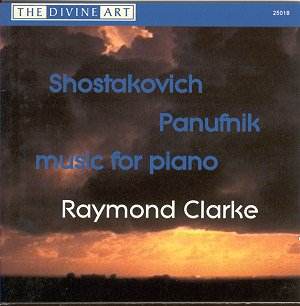Shostakovich was trained as a pianist, played many
of his piano works in public and even recorded some of them (e.g. the
piano concertos with André Cluytens and the Orchestre National
de la RTF for Columbia). Raymond Clarke chose to record some of the
early piano works of which the Three Fantastic Dances Op.5
are the best known. The Five Preludes Op.2 were written
by a fourteen year old boy with a good feel for the instrument and a
considerable compositional technique. In fact, the original set of eight
preludes is now lost. Some time later, however, Shostakovich and two
friends planned a set of 24 preludes along the same lines as Chopin’s
own 24 Preludes Op.28 for which Shostakovich had selected
five pieces from his early Op.2 set. The project came to nothing but
his Five Preludes Op.2 were eventually published in 1966,
and that is what we have here. The whole set is a delightful, youthful
piece that clearly deserves to be heard, as are the Three Fantastic
Dances Op.5 that already show Shostakovich’s liking for some
bitter-sweet irony. Irony is also what characterises most of the Ten
Aphorisms Op.13 in which the composer seems to be rebelling
against the academicism of the training which he had received from Glazunov
and Steinberg. To quote Raymond Clarke, "a young composer throwing
out the rule book", for each of these short pieces manages to include
some perturbing element or unexpected twist within what might have been
a traditional character piece.
Panufnik’s name may not be generally attached to piano
music, though he too was a brilliant pianist in his youth, but composing
and conducting became his main activities for most of his life. The
three works here, spanning his whole composing life, actually make up
his entire piano output. The Twelve Miniatures, composed
in 1947 and revised in 1956 and 1964, are a suite of short, clearly
characterised studies in the strict meaning of the word. The last study
is a beautiful meditation of some substance. One really wonders why
this fine work is so rarely heard, if at all. Reflections,
composed a few days after his daughter’s birth and dedicated to his
wife, was first performed by the late John Ogdon in 1972. As Clarke
rightly remarks, the title implies both contemplation and the idea of
the mirror-image. Quite rightly so, for many works by Panufnik are structured
as palindromes of one sort or another, and the five linked sections
of Reflections are also roughly laid-out as a palindrome.
No bar lines are included in the score, emphasising the improvisatory
character of the music.
Panufnik’s last piano work, Pentasonata,
completed in 1984 with some revisions in 1987 and first performed in
1989, is in five sections relating to aspects of the classical model,
also arranged as one large-scale palindrome. The prefix penta
refers to the number of sections, to the pentatonic scale on which the
whole work is based and also to the quintuple metre. Panufnik’s music
is often based on elaborate technical considerations which are nevertheless
best forgotten when listening to the music. They only serve as a technical
framework in which the composer’s imagination may then be given its
full expression, for Panufnik’s music aims, first and foremost, at communicating
deeply-felt emotions while eschewing any temptation towards sentimentality.
As such, Panufnik’s piano music may show some more private, intimate
sides of its composer; and, though few in number, its musical and expressive
qualities are unquestionable.
Raymond Clarke already put us much in his debt with
several outstanding recordings, of which I will single out his superb
Mathias/Pickard
CD (Athene ATH CD15); and this release is another magnificent offering
from this fine performer.
Hubert Culot


